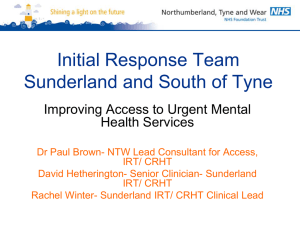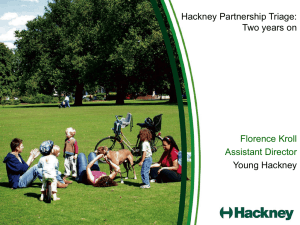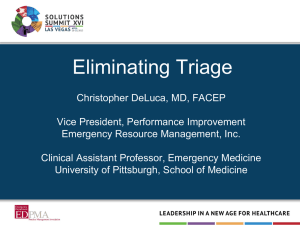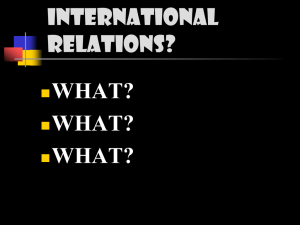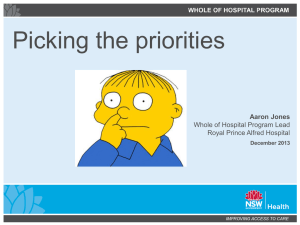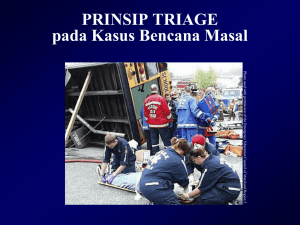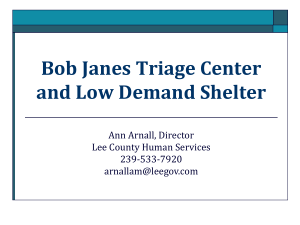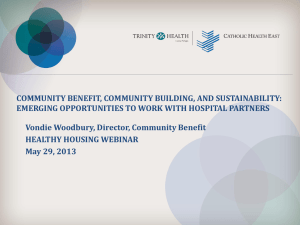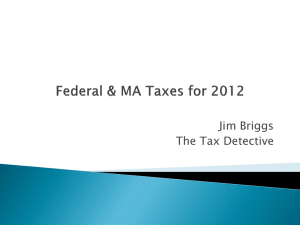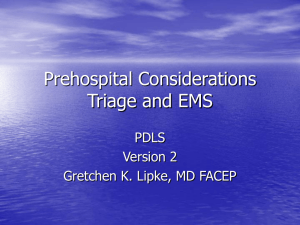file
advertisement
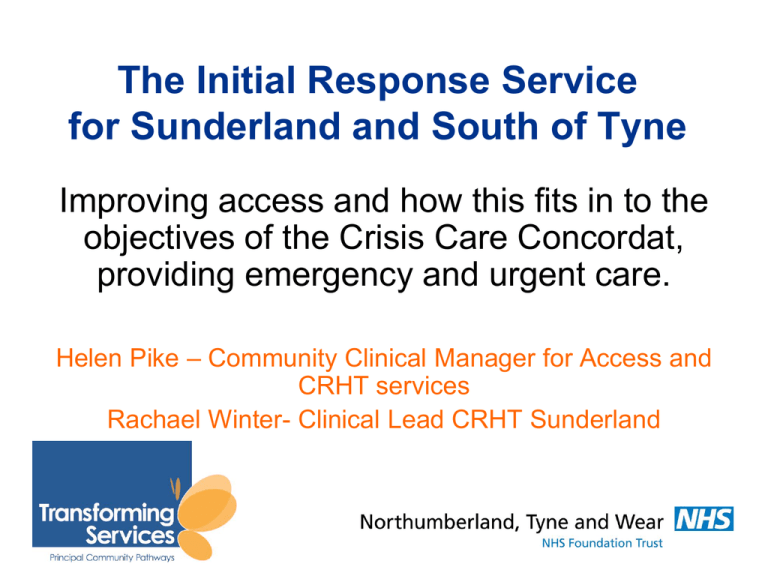
The Initial Response Service for Sunderland and South of Tyne Improving access and how this fits in to the objectives of the Crisis Care Concordat, providing emergency and urgent care. Helen Pike – Community Clinical Manager for Access and CRHT services Rachael Winter- Clinical Lead CRHT Sunderland Overview • • • • Context IRS Model Development IRS Evaluation/ Outcomes Other key services key to the Concordat The Service Model Review Request for Help Information & Advice Initial Response Initial evaluation regarding nature, risk, complexity and urgency of the problem More Intensive Packages of Care Hospital Signposting to principal service pathway for assessment and formulation Psychiatric Intensive Care Treatment Intensity Low Security Specialist Ward Crisis Beds PICU Environment Acute Ward Intermediate In the Community Low Security beds Intermediate Facility Challenging Crisis Bed Behaviour Acute Ward Mild severe non psychotic Very severe & complex nonpsychotic Psychosis Dementia Assessment Intensive Home Treatment At Home Intensive Home Home Etc. Challenging Behaviour Treatment Assessment Formulation & Treatment Planning Crisis Assessment Discharge Neuro disability Learning Disability Children & Young People Substance Misuse Scaffolding Medium Security Access Phase 1: The case for change Sunderland was chosen as the 1st location for the development of a new urgent access model following discussions with service users, carers, GPs and commissioners. Like a lot of areas there were: •Problems getting through to Crisis Team by phone as Triage saturated++ •Overnight and at peak demand times callers could wait hours for a return call from a clinician •No ready point of access for Older People or People with a significant Learning Disability seeking Urgent Advice/ Intervention •Fewer than 35% of referrals needed a admission/ home treatment •Most of the non-crisis referrals required advice/ signposting but at low risk/ acuity Engagement • Large scale events- Local Authority, GP’s, Commissioners, Service Users • Focussed Group Events- Service Users, GP’s, Staff, 3rd sector. • Series of design workshops • Ongoing engagement through and after implementation Initial Response Service South of Tyne and Wear Information Collection & Routing Gateshead Rapid 11 Response Nurses Triage & Action South Tyneside REQUEST FOR HELP GH UCT ICTS Home Based Treatment Assessment LD Gatekeeping ST UCT Home Based Treatment Rapid 11 Response Nurses Triage & Action Sunderland ROUTING ICTS OPS Assessment LD Gatekeeping SL UCT Home Based Treatment Rapid 11 Response Nurses Triage & Action OPS ICTS OPS Assessment LD Gatekeeping Phase 1: The Model •IRS to offer 24/7 Universal telephone access for requests for urgent help. •No restrictions on who could refer •Triage and Routing over the phone- (Mental Health and other local Services) •Face to Face Triage (Rapid Response) if clear plan cannot be determined over the phone •Seven Band 6 Nurses for Telephone and Rapid Response •Five Band 3 Nurses for call handling and Rapid Response •Use of digital dictation and 3G laptops for clinical documentation •Flexible interchangeable roles and rotation between Crisis Team and IRT roles dependant on demand. Phase 1: Benefits of IRS • Quick and efficient responses to requests for help • Effective routing to the correct services in and out of NTW • Flexible and collaborative working systems implemented • Reduction of clinician administration burden, and freeing time to care (mainly through adoption of mobile digital dictation) • Improving personal and clinical outcomes for people in crisis with mental ill health by reducing admissions/ MHA detentions, improving patient safety and patient experience Evaluation-IRS in numbers Typical weekly activity •1500+ Incoming telephone calls •1000 Total Contacts •400 Home-based Treatment contacts •50 Crisis Assessments •100 Rapid Responses …and growing •90% calls answered within 15 seconds •>98% within 3 minutes (Average=9 Seconds) •>80% rapid responses achieved in under one hour IRS Referrals (Q3 2013) Other includes: • Self Harm Team • Acute Care Trust • NTW Inpatient Ward • Ambulance • Consultant Psychiatrist • Residential Care Facility • Drug and Alcohol Services • IAPT • Member of Public • EDT • Probation Service Feedback Service User and Carer GP The service is responsive and friendly I felt listened to and was delighted Fantastic – a huge improvement!! You should have done it before Staff More manageable A lot happier Skills are valued Spend more time I cannot imagine where I would be today if you had not been there for me. I couldn’t have got this far without your help You do an amazing job! You listened and told me what to do Keep this very valuable service going You are all very dedicated, patient, compassionate people Wonderful support! Impact on acute bed-usage Smoothed bed day rate (per 10,000 18-64 pop) Bed day rate (per 10,000 18-64 pop) 260 240 220 North of Tyne 200 South of Tyne 180 NTW 160 Launch of IRSSouth only 140 Oct-Dec 2012 JanMar 2013 Apr-Jun Jul-Sept Oct-Dec 2013 2013 2013 JanMar 2014 Apr-Jun Jul-Sept 2014 2014 Phase 2 IRS Model UCT IRS Urgent Home Based Treatment Rapid Response 11 Nurses Triage & Action Single Point of Referral ICTS OPS Assessment Gatekeeping LD Triage Team Noncomplex Clinical Diary Routine Complex Huddle Clinical Diary Other Key Services in Sunderland: • High spec (RAID-esque) Psychiatric Liaison Team (Jan 2014) • Street Triage (from Sept 2014) • Court and Custody Diversion (2013) • Transformation of Community Pathways (PCPlate 2014) • Home treatment alternatives for patients with LD/ OPS service needs- ongoing • Extended Hours Urgent-Care Consultant Working- (Nov-2014) Summary • IRS developed in a context of shared goals with commissioner and wider partners • IRS shown to vastly improve access & responsiveness with widely positive feedback • Crisis Care and Access cannot be improved by oneservice alone- needs a networked- collaborative response
